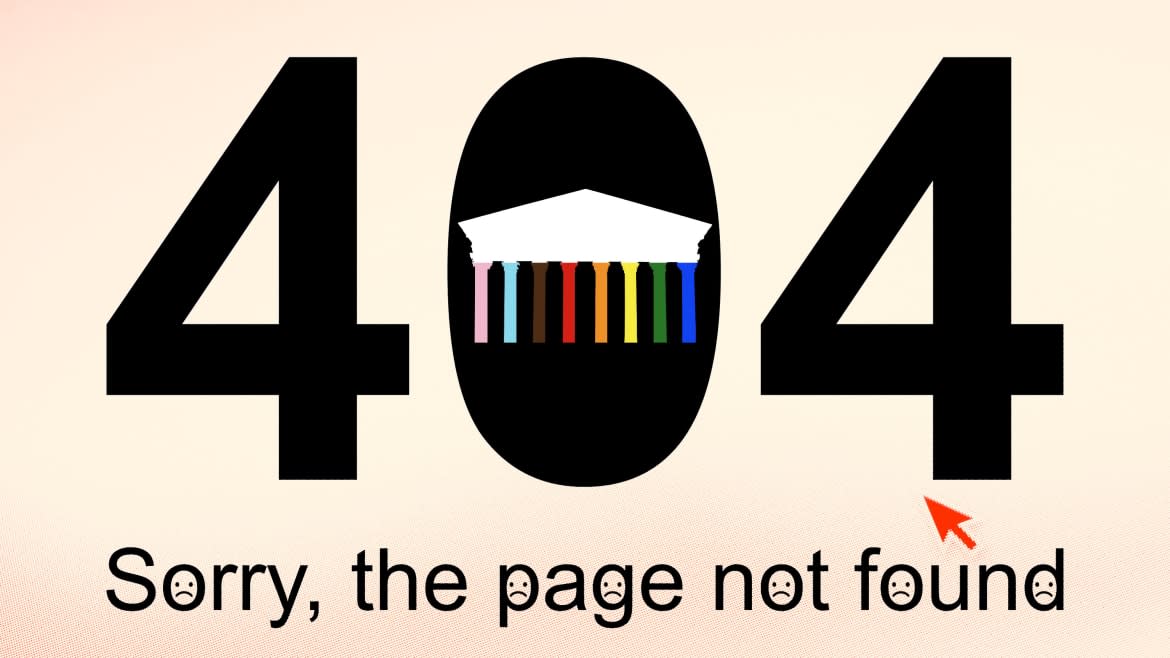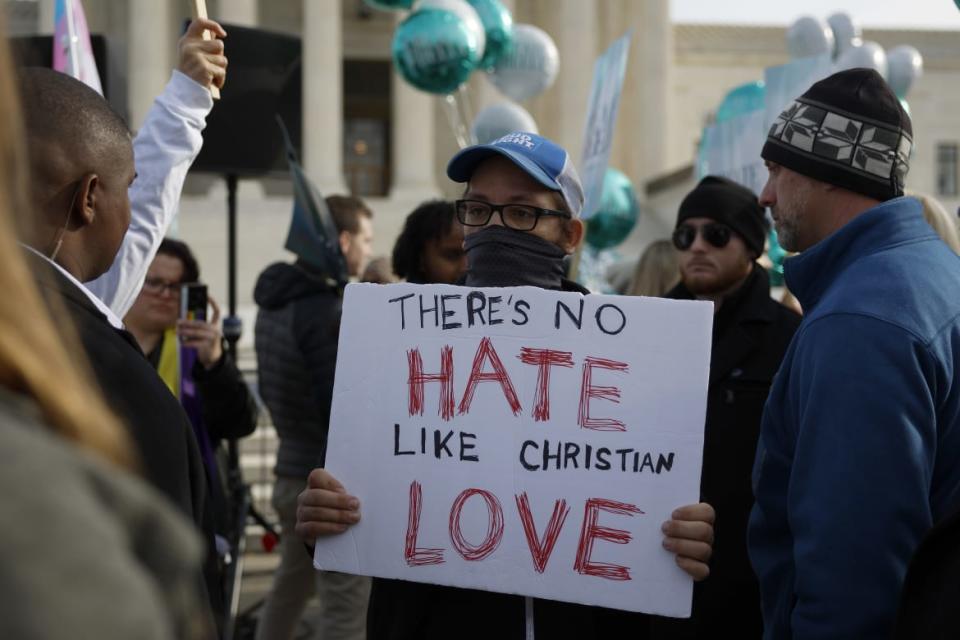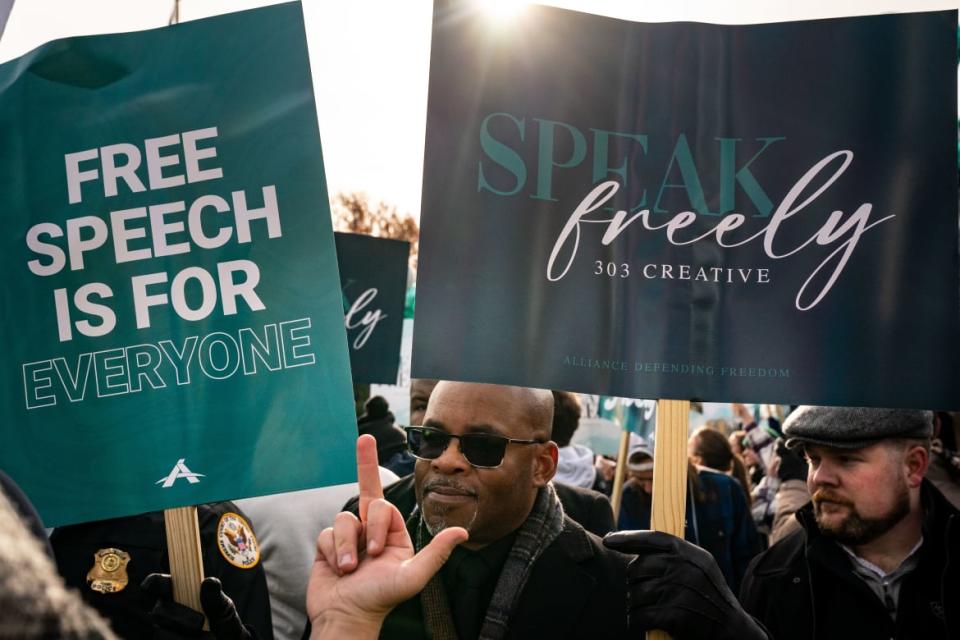The Supreme Court’s Decision on Anti-LGBTQ Discrimination Is Incoherent

- Oops!Something went wrong.Please try again later.
On ideological lines, the conservative-supermajority Supreme Court today voted 6-3 to allow a Colorado web designer to refuse to design websites for same-sex couples.
No doubt, Republicans and others on the right will celebrate this decision, 303 Creative v. Elenis, in broad terms: businesses may now “turn away the gays.”
But Justice Neil Gorsuch, who wrote the Court’s opinion, insists otherwise. No, no, no, Justice Gorsuch assures us: you can’t turn away the gays, you can only turn away gay weddings.
Supreme Court Might Allow Vendors to Discriminate Against Customers
If you see a distinction there, then the Court’s opinion makes sense. If you don’t, then it’s preposterous.
Justice Gorsuch is definitely right on the technical details of the law. The web designer in the case, Lorie Smith, has stipulated that she’ll make a website for anyone, queers included. What she won’t do, though, is make a website celebrating a gay wedding, because she thinks those weddings are “false.”
So, technically, she’s not discriminating against gay people, see? And then the case starts to look different, because Colorado, whose anti-discrimination law protects LGBTQ people, would be forcing her to say things she doesn’t believe. This ends up being a free speech case, and the web designer wins.
But Justice Sonia Sotomayor, in her dissent, completely refuses this framing. The designer is “a business open to the public seek[ing] to deny gay and lesbian customers the full and equal enjoyment of its services.” Full and equal enjoyment—meaning, I as a gay person get to utilize those services the same way a straight person does. That makes this case about what, in legal terms, is known as “public accommodations” because there’s no distinction between status and conduct.

Supporters of web designer Lorie Smith and counter-protesters demonstrate in front of the U.S. Supreme Court Building on Dec. 5, 2022, in Washington, DC.
Can you hang a sign on your door saying “No Blacks Allowed” or “No Jews Allowed”? No—even if you really don’t like Blacks or Jews, and even if you have a religious reason for doing so. Likewise here.
Or, in Justice Sotomayor’s words, quoting an earlier case, 303 Creative “cannot define their service as ‘opposite-sex wedding [websites]’ any more than a hotel can recast its services as ‘whites-only lodgings.’”
Moreover, Justice Sotomayor continued, Smith isn’t just saying she personally won’t type the words for a website. She’s saying that her for-profit company, 303 Creative, wants to publicly advertise their services to everyone, but then withhold them categorically from all gay customers.
There were many other ways that Smith could have accommodated her religious beliefs, writes Justice Sotomayor. “The company could, for example, offer only wedding websites with biblical quotations describing marriage as between one man and one woman… [it] could also refuse to include the words “Love is Love” if it would not provide those words to any customer. All the company has to do is offer its services without regard to customers’ protected characteristics.”
But of course, that’s not really what this case is about.
America’s Tragedy Is Its Culture of Fear—Armed With Millions of Guns
Smith, and, more accurately, the Alliance Defending Freedom and other Christian Right groups supporting her, wanted to make that broad statement. They wanted to say exactly what Justice Gorsuch says they aren’t saying: that it’s OK to turn away the gays.
Which, obviously, is how this opinion will be received. No doubt, the GOP presidential candidates will praise it in their press releases. No doubt, it will be perceived as part of the widespread backlash against LGBTQ (especially trans) equality, and will pave the way for future decisions that expand this right. Everybody knows this. It’s how the Supreme Court functions in our society.
Meanwhile, the notion that this case is really about free speech is belied by some logical consequences of the decision. Suppose a web designer publicly refuses to make a website for a mixed-race wedding. Under the Court’s logic, that is protected speech. After all, they’re not discriminating against Black or white people—they’re only refusing to say things about interracial weddings. Speech, not discrimination. Right?
Obviously not right.
The Supreme Court Is Poised to Chip Away at Same-Sex Marriage
But why stop there? Remember this case is also, per Gorsuch, about conduct, not status. So suppose a racist opens a bed and breakfast. They say, “Anyone can stay here, but I can’t let a Black and a white person sleep in the same bed, since race-mixing is forbidden by God. After all, they might have sex.” Conduct, not status, right?
Obviously not right. But if the status/conduct distinction that Justice Gorsuch makes is applicable, and if that distinction lets one weasel out of public accommodation law, it applies as much to the odious B&B owner as to this web designer.

A protester gestures at a man holding signs in support of Lorie Smith/303 Creative as people gather in front of the Supreme Court of the United States on Monday, Dec. 5, 2022, in Washington, DC.
But here’s a twist: in an odd way, Justice Gorsuch’s narrow framing may be of value to LGBTQ people. Because it’s important to not let our haters define this case.
In 2018, when Masterpiece Cakeshop, the case about a Colorado baker refusing to bake a wedding cake for a gay couple, was decided, many journalists and LGBTQ organizations decried it as granting businesses a broad license to discriminate. There may be good reasons for that: raising money, raising awareness, getting people engaged and motivated.
But there are better reasons not to do that.
Neil Gorsuch Might Be the Supreme Court’s LGBTQ Rights Savior. But He May Not.
Masterpiece Cakeshop was actually a very narrow case, decided on the faulty way that the baker’s claims were adjudicated by a civil rights commission. It did not grant a license to discriminate by any means. But court decisions shape culture. Once everyone agreed that Masterpiece Cakeshop made LGBTQ people second-class citizens, then that’s how it was understood in society, even if that’s not what it actually said. Our interpretations of these cases affect their impacts.
Likewise here. Even if Justice Gorsuch’s distinctions are specious, they are now the law of the land. That means that 303 Creative is about freedom of speech narrowly—not “turn away the gays” broadly. It is not a license to discriminate, and it is not about limiting same-sex marriage. It does not impact non-speech-related activities, like running a restaurant or offering health insurance to same-sex spouses. It is only about when the state compels someone to write or say something they don’t want to say.
So let’s take Justice Gorsuch at his word—even if we think Justice Sotomayor has the better argument. Let’s not allow those who want to take away our rights to define this as a big victory for family values. Let’s frame it exactly as the Supreme Court has: as about free speech and nothing more. Let’s not give our enemies more of our freedom than they’ve actually taken away.
Get the Daily Beast's biggest scoops and scandals delivered right to your inbox. Sign up now.
Stay informed and gain unlimited access to the Daily Beast's unmatched reporting. Subscribe now.

